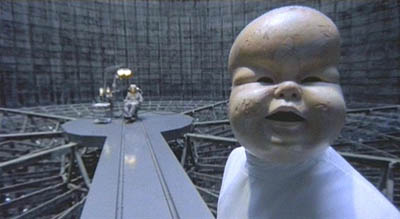 Terry Gilliam’s Brazil |
Terry Gilliam has a long career as a darkly fantastic and absurd filmmaker. Brazil is considered his masterpiece by most fans. Inspired by George Orwell’s “1984”, and the working title for the film was “19841/2,” “Brazil” also takes place in a world overrun by a totalitarian bureaucracy, where an oppressive government watches its citizen’s every move.
Gilliam’s experiences with the film industry and the bureaucracy overseeing his directorial efforts may have helped his ability to convey the frustration Brazil’s bureaucracy evokes in its viewers. Universal thought the movie was too depressing for American consumption and had created a heavily chopped version for release in the States. Gilliam had to fight Universal to have his vision released.
Tom Stoppard is part of the team of writers who produced the script for “Brazil,” and his influence shows. The ironic dialogue matches that of his famous play “Rosencrantz and Guildenstern Are Dead.” The characters are instantly familiar as they are in his work “Shakespeare in Love.” His writing is simultaneously oddball and sophisticated, matching up perfectly with Terry Gilliam.
The film is as complicated and convoluted as the world in which it takes place, and demands multiple viewings to appreciate it. I have seen this film more times than I could count and each time I am amazed to find something new. Entire film classes can be dedicated to the deconstruction of this work and still not exhaust its innumerable dimensions of significance.
To summarize the plot of this film would be an affront to its many dimensions and its confusion, and I always cringe when I see a reviewer attempt this. We have a main character, Sam Lowry, a man very proficient at his job, but who is also a dreamer. We have a love interest, Jill Layton, who is the woman of Sam’s dreams. We have a totalitarian state that has recently tortured to death an innocent man because of a typo on a warrant. We have a handyman terrorist, Harry Tuttle, who breaks the law by fixing things. We have Ida Lowry, Sam’s mother, who is getting younger and younger throughout the film thanks to plastic surgery. We have Spoor and Lime, who work for Central Services and cannot do anything without a 27B-6.
All of these characters live under the oppression of the state, and the film is disarmingly calm about the horrors taking place around them. A smiling secretary takes dictation from a torture session and Sam can read on the transcript: “Oh God! Please–no! Stop! I beg you!” An innocent man is taken into custody, murdered under torture, and the biggest complication arising from this is getting a refund check to the widow, who was overcharged for her husband’s interrogation. A bomb goes off in an upscale restaurant. The string quartet picks themselves up, scorched from the blast, and continues playing. The waiter quickly has the staff put up a barrier to hide the flailing victims. Mrs. Terrian, Sam’s mother’s friend, complains of the nuisance, turns to Sam and demands, “Why don’t you do something about these terrorists?” To which Sam calmly replies, “It’s my lunch break.”
 Room 1001 |
Am I giving away too much? That would be impossible where this film is concerned. I am giving away the details that stand out in my mind, but other people who see this film will pull entirely different details from the exact same scenes. So much is going on each moment that the audience impressions of the film are highly personalized. When I mentioned the above scene to a friend, he responded with a comment about the obsessive-compulsive waiter–an aspect of the scene I had always overlooked. Brazil is my all-time favorite film because I can watch it over and over again, and I have yet to watch it without coming away with some new detail.
Spoiler Warning! For Both “Brazil” and “1984”
In most tragedies, the main character has some flaw that brings about their doom, and Sam certainly makes some very panic-influenced mistakes, but the world he lives in would have condemned him eventually regardless. Not only does this world kill Harry Buttle, thinking him Harry Tuttle because of bad paperwork, but we see other mistakes throughout the film as well. Sam’s “Personal Transport” becomes a “Personnel Transport,” which eventually becomes a “Fleet of Personnel Transports.” Jack Lint remarks that his department is well aware of Jill Layton, and is certain she is involved with the terrorists somehow. The terrorists do not exist, aside from their one appearance in Sam’s final fantasy. We may be certain that Jack’s involvement with Sam will eventually bring about his own arrest and interrogation.
In contrast to the book that inspires it, “Brazil” has a positive ending — relatively speaking. Winston Smith of “1984” is a broken man at the end of the book. They have gotten inside his mind and rewired him so badly that his thoughts are no longer rational. Sam Lowry escapes his tormentors at the end of “Brazil”, by fleeing deep into his fantasies and escaping reality to hide deep inside his mind.
Some critics believe Sam is actually lobotomized at the film’s end, and the fact that the torture instrument being brought toward his face is a lobotomization tool supports this; however, the tool is also designed specifically to destroy the frontal lobe of the brain, which would not cause enough brain damage to explain Sam’s catatonic state. Gilliam leaves us with the events taking place in Sam’s mind, a fantasy life with Jill, for a purpose. When Mr. Helpmann and Jack Lint leave Sam alone, we can detect Sam humming a happy tune to himself, the torture room vanishes, and fills with blue sky and clouds. Unlike “1984,” where the totalitarian forces can and do get into the mind, in “Brazil” that is the last refuge of freedom, which no outside force can infiltrate.